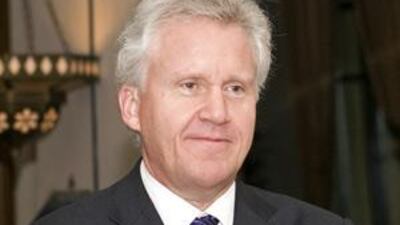General Electric (GE) aims to increase its business in the Middle East by 10 to 15 per cent a year and target nuclear projects in the Gulf after losing a US$20.4 billion (Dh74.92bn) bid this month to build four nuclear plants in Abu Dhabi. "We didn't win it, but we would love to do a nuclear project in the Middle East as more of them become open and commercially available," Jeffrey Immelt, the chairman and chief executive of the US technology and services conglomerate, said yesterday.
"We would like to become a broad energy participant in the region." The winning bid for the power plants was announced on January 5 following stiff competition between the Korean consortium that was awarded the contract, another group led by GE and a third French group. Despite losing the deal, Mr Immelt said GE would continue to grow in the region and was eager to build on a multibillion-dollar joint venture signed in 2008 with Mubadala Development, the strategic investment arm of the Abu Dhabi Government.
"I think there will be more in the future [with Mubadala]," said Mr Immelt, pointing to potential partnerships outside the Middle East, perhaps in Africa. "I think we're like-minded. We've had a very strong relationship and I think we're just in the beginning stages." GE and Mubadala announced a partnership in July 2008 that included an $8bn commercial finance venture that Mr Immelt said had started doing business in the fourth quarter of last year.
GE will also conduct research on clean water and clean energy in Masdar City, a carbon-neutral development being built near Abu Dhabi International Airport, and help Mubadala to increase its aircraft engine maintenance and oil services business. An investment in Mubadala's clean technology fund and a corporate learning initiative were also part of the deal. Mubadala also plans to become one of GE's 10 largest shareholders through stock purchases as market conditions allow.
"We're quite encouraged by our prospects there," Mr Immelt said of the deal. "We've now ramped up, we're hiring people, we're originating business, so we see that growing nicely in 2010 and beyond." GE last week reported a 19 per cent drop in fourth-quarter earnings compared with the same period in 2008, mostly due to weakness in its commercial finance business, the centrepiece of its joint venture with Mubadala. GE Capital's earnings fell 67 per cent compared with the fourth quarter in 2008 as the division underwent a restructuring.
But that would not affect the Mubadala partnership or GE's interest in expanding its finance, industrial and infrastructure businesses in the Middle East and Africa, Mr Immelt said, adding that he would be "disappointed if we're not growing 10 to 15 per cent in this region". "For the first time since 1940 we had a synchronous global recession in 2009, so that has an impact as you go through it, but we never stopped investing in research and development, we never stopped investing in our global footprint, and we think that will pay dividends as we look at 2010."
Mubadala and GE were a strong pairing, Mr Immelt said, because they shared a core interest in infrastructure and financial services. He left open the possibility of future joint ventures in sectors such as aviation, energy and health care, and a partnership for investments in other regions, such as Africa. Within the Middle East, he said GE was keen to forge partnerships in the region's nascent healthcare industry, a sector in which GE has a large global presence.
"Health care has really moved to the top of the list in terms of what's on people's minds, where capital is going to go and where investment is going to go," he said. @Email:afitch@thenational.ae

